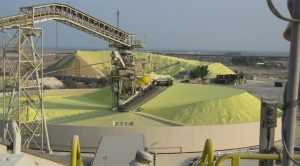Worldwide sulphur projected shortage
A projected shortage of sulphuric acid could stifle green technology advancement and threaten global food security, according to a paper published in The Geographical Journal.
Sulphuric acid is required for the production of phosphorus fertilizers and for extracting battery metals such as nickel and cobalt from ores.
The recent study points out that global demand for sulphuric acid is set to rise significantly from 246 to 400 million metric tons by 2040 — a result of more intensive agriculture and the world moving away from fossil fuels.
The authors estimate that this will result in a shortfall in annual supply of between 100 and 320 million metric tons — between 40% and 130% of the current supply — depending on how quickly decarbonization occurs.
Sulphur related incidents in Canada
July 19 2021: Port Moody, British Columbia
A fire that broke out at a sulphur terminal in Metro Vancouver over the weekend is under investigation. Fire crews were called to Pacific Coast Terminals in Port Moody late Sunday afternoon. In a statement, the company said the fire happened near the ship loader on one of its conveyors. “Port Moody Fire Rescue responded quickly and no one was hurt in the incident. The fire has since been put out and the cause is currently being determined,” Pacific Coast Terminals said in its statement. “We sincerely apologize for any disturbance this caused and we are extremely thankful for the quick actions of the staff onsite and Port Moody Fire Rescue.” Few details have been provided by officials, but a ladder truck was used to douse the flames. Fire crews haven’t said what may have caused the fire.
March 21, 2022: North Vancouver, British Columbia
Police in North Vancouver, B.C., say they do not yet know when a derailed train will be up and running again. According to North Vancouver RCMP, the Canadian National Railway (CN Rail) train came off the track just after 7:30 p.m. Sunday in the Lower Lonsdale area. A statement from CN Rail said at least two cars containing solid sulphur derailed upright. The mineral is used in a variety of household and industrial products. Preliminary information indicates there was a leak of solid sulphur contained to CN’s property but there were no fires, injuries, or danger to public safety. First responders confirmed no one was injured and said there is no risk to the public. “It may take some time to get these trains back up and onto the track,” said Sgt. Peter DeVries. DeVries said firefighters were on the scene immediately and that they had “no concerns about any leakages or contaminants.” The cause of the derailment is now being investigated by the Canadian National Police Service, a private railroad police force that helps protect CN Rail property, personnel and rail infrastructure. “CN would like to apologize for the inconvenience caused by this incident and would like to thank first responders for their help and support,” said the company in a statement. DeVries said Monday morning the derailment has not caused any road closures.
June 28, 2019: St Clair, Ontario
CN train derailed inside the Port Huron-to-Sarnia rail tunnel under the St. Clair River Friday morning, with one rail car leaking sulfuric acid.The rail company said in a statement that about 40 cars derailed in the tunnel, which connects Michigan to Ontario, in “various positions” while “at least one car with dangerous goods is involved.”CN said in a statement Friday afternoon, a car containing about 52,000 litres of sulfuric acid has leaked as a result of the derailment. “The sulfuric acid is contained to the site of the derailment and poses no danger to public safety or to the St. Clair River,” company spokesperson Jonathan Abecassis said. “CN is collaborating with the Municipality of Sarnia and St-Clair County as well as the Municipality of Port Huron.”Sarnia’s Aamjiwnaang First Nation Emergency Planning said in a statement at least two derailed cars were carrying new vehicles which are blocking the Canadian side of the tunnel. Diesel and other motor vehicle fluids have spilled inside the tunnel, according to the agency.According to Port Huron City Manager James Freed, no injuries have been reported and there’s no threat to public safety as a result of the train derailment.Freed said U.S. Homeland Security and Emergency Management agencies have been briefed on the incident.CN also noted there were no fires or injuries reported at the scene of the derailment, adding the cause of the situation is under investigation.Transportation Safety Board of Canada said Friday afternoon, the agency will dispatch a team to Sarnia to assist in the investigation.CN said trains are being rerouted, while there’s no estimation as to when the tunnel will reopen to traffic.
February 19, 2019: Grassland, Alberta
RCMP say the debris has been cleared and traffic is moving again on a busy northern Alberta highway after a semi-trailer truck carrying molten sulphur rolled, resulting in a cargo leak. The single-vehicle accident happened Monday on Highway 63, east of the community of Grassland. Police say no one was hurt when the truck ended up in a ditch. Detours were set up and officials expected it would take quite some time before the area was cleared. There was no immediate word on how much sulphur leaked. Grassland is about 180 kilometres north of Edmonton.
February 1, 2019: Port Moody,British Columbia
A recent fire at Port Moody’s Pacific Coast Terminals that sent four workers to hospital has the union representing employees raising concerns over the company’s safety protocols. Jerry Yamamoto, a member of the International Longshore and Warehouse Union executive, said PCT is not following federal regulations when it comes to workplace safety and incident reporting. “Upon initial investigation, we found immediately they’re not compliant in many areas,” he told The Tri-City News this week.
Port Moody Fire Department confirmed a blaze occurred Jan. 9 while contractors were doing welding work inside the sulphur train dumper. According to Local 500, four people were taken to hospital and one has not been able to return to work.
Yamamoto said when the incident occurred, there was no emergency callout to workers, staff or the fire department until one of the affected workers dialled 911. Even more concerning, he said, is that he has since learned of two other fires on the waterfront site that were not reported to the union’s safety committee. The lack of transparency is problematic, he added, because assessing incidents, even if they are minor, helps ensure that they do not occur again. “That is the whole purpose for the language behind occupational safety,” he said. “Those documents are all meant to be preventative measures.” Yamamoto said he has concerns over how large the fire could have grown if a worker hadn’t dialled 911. “The potential there isn’t being taken seriously,” he said, noting sulphur dust is rated as a combustible material. “What were to happen if no one was in the dumper itself and we had a fire? At what point would we have notification? How severe a level?” Last month, PCT celebrated having the best safety record of all terminals in Port Metro Vancouver. According to the company, it has not had a lost-time accident for 1,519 days (more than four years) in the company’s maintenance division and it has been more than six years since employee time was lost due to a safety incident.
“We are proud to celebrate the professionalism and commitment of our staff in ensuring the safest and healthiest workplace,” former vice-president and general manager Ken Catton said in a news release at the time. But Yamamoto said lost-time incidents are the wrong statistic to be using for basing safety recognition. In a statement to The Tri-City News, PCT said during last month’s fire the company halted operations and evacuated personnel immediately. The company wrote in a statement that the fire was extinguished within an hour and the workers were sent to hospital “as a precautionary measure” and discharged within 24 hours. “These types of incidents are very unfortunate and we’re deeply concerned when any of our personnel are affected,” the statement said. “We have a strong culture of safety at PCT, including extensive procedures and specialized equipment that help us to prevent and respond to incidents.” The company said it would be reviewing the Jan. 9 incident with the joint safety committee, which includes representatives from Local 500. But in a response to follow up questions, Andre Olivier, PCT’s vice-president and general manager, acknowledged that another fire occurred in the sulphur train dumper last August that was not brought to the union’s attention.
He said while workers were unloading a train, “smoke was observed in the sulphur dumper for approximately 20 seconds. Work was halted and water was applied and when no further smoke was observed operations resumed.” Because the incident was deemed minor, it was “not discussed at the joint safety committee, as there was not assessed risk to worker safety stemming from that incident.” Port Moody Fire Department told The Tri-City News it has protocols in place for dealing with emergencies at PCT. Deputy Fire Chief Jason Harper said firefighters have worked with the company to ensure fires are extinguished on the site quickly. “Our department has worked very closely with PCT and understanding the hazards of their site and how our best approach is when we have different kinds of emergency incidents,” he said. “Our response to fire incidents are similar with all industry as we have to ensure the safety of our personnel before we can actively commit to fighting any fire.”
April 28, 2018: Mayerthorpe, Alberta
Several cars of a CN train carrying sulfur derailed near Mayerthorpe on Friday afternoon.A total of fourteen trains derailed on Greencourt Road at approximately 4 p.m.CN said there were no injuries or threat to public safety, and asked the public to stay away from the area of Highway 22 north of Range Road 85 as they removed the cars and product Friday evening.The cause of the derailment is under investigation. Mayerthorpe is approximately 130 kilometres northwest of Edmonton.
April 11, 2018: Trail, BC
Westcan Bulk Transport issued an April 11 statement regarding a sulphuric acid release the previous morning in the Trail area. “Shortly after 8:00 a.m. PST, there was a release of sulphuric acid from a Westcan Bulk Transport truck during the 16-km drive from Teck’s Trail Operations to the Quark Siding reload station in Waneta,” said the release. The statement added, “The release was quickly identified and our incident response team secured the area to assess the incident and begin the clean up process, with the assistance of the Teck Emergency Response Team. “The cleanup was completed at approximately 2:00 p.m. PST today (Tuesday). We can confirm that there was no waterway or ground water contamination as a result of the release and do not expect there to be any long-term health, safety or environmental impacts.” The company did offer some precautionary actions for anyone concerned. “Anyone who feels they may have come in contact with the product should avoid inhalation, digestion, and skin contact and wash any surface or item that may have come in contact with the product as a precaution. “Anyone who was traveling in the vicinity at the time of the release and is concerned that their vehicle may have come in contact with the product should run their vehicle through an automatic car wash as a precaution to safely dilute and remove any residue. “Our safety team is currently investigating to determine the cause of the release and the equipment involved has been taken out of service until a cause can be determined.”
Sulphur Overproduction Introduction
Canada’s Sulphur production
Worldwide sulphur projected shortage
Sulphur related incidents in Canada



